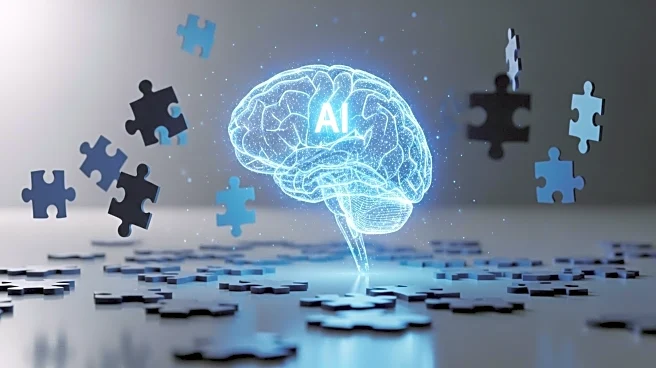What's Happening?
The rapid advancement of artificial intelligence (AI) is prompting a significant shift in workforce dynamics, particularly in the tech and IT sectors. Companies like Tata Consultancy Services (TCS) are laying off thousands of mid- and senior-level employees, highlighting the urgent need for workforce reskilling. The demand for roles in these sectors has decreased, with a notable reduction in mid- and senior-level positions. This trend underscores the shrinking shelf life of skills due to digital transformation and the AI boom. As a result, professionals are increasingly required to update their skill sets to remain relevant. Upskilling is becoming a critical component of business strategy, with companies seeking leaders who possess a digital mindset and can drive technological change. The focus is shifting from mere awareness to achieving tangible outcomes and building long-term capabilities.
Why It's Important?
The emphasis on reskilling is crucial as AI continues to automate routine tasks, necessitating a workforce that can adapt to new technologies. This shift has significant implications for U.S. industries, particularly in tech and IT, where the ability to leverage AI effectively can determine competitive advantage. Companies investing in upskilling are likely to benefit from increased efficiency and innovation, while those that fail to adapt may face challenges in maintaining their market position. The move towards a digitally skilled workforce also impacts public policy and education systems, which must evolve to support lifelong learning and skill development. As AI reshapes job roles, there is a growing need for human-centered leadership that emphasizes empathy and ethical decision-making, further influencing organizational culture and employee engagement.
What's Next?
As the demand for AI-related skills grows, companies are expected to increase their investment in learning and development programs. This includes creating tailored, role-based learning journeys that align with business goals. Organizations may also explore partnerships with educational institutions to develop specialized training programs. The focus will likely be on integrating learning into everyday work, making it a continuous process rather than a one-time event. Additionally, there may be increased collaboration between industry and government to address skill gaps and ensure a workforce that is prepared for the future. Companies that successfully navigate this transition will likely emerge as leaders in their respective fields, while those that lag may struggle to keep pace with technological advancements.
Beyond the Headlines
The push for reskilling also raises ethical and cultural considerations, as it challenges traditional notions of career progression and job security. Employees may face anxiety over job redundancy, necessitating support systems that address these concerns. The shift towards a more flexible and application-driven learning model may also influence workplace dynamics, promoting a culture of continuous improvement and adaptability. As AI becomes more integrated into business operations, there is a need to balance technological efficiency with human values, ensuring that automation enhances rather than diminishes the human experience in the workplace.









